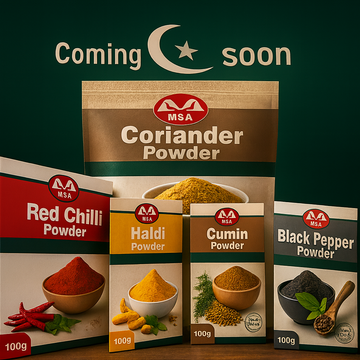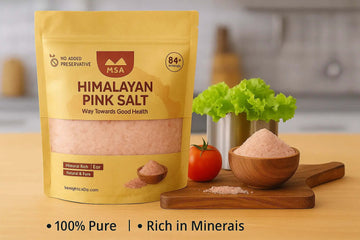
Himalayan pink salt has gained popularity in recent years, not just for its aesthetic appeal, but also for its various health benefits. This natural salt, sourced from the Himalayan mountains, is often touted as a healthier alternative to regular table salt. In this article, we'll explore the numerous advantages of incorporating Himalayan pink salt into your diet, from its minerals to its potential health benefits.
What is Himalayan Pink Salt?
The Origin of Himalayan Pink Salt
Himalayan pink salt is primarily mined from the Khewra Salt Mine in Pakistan, which is one of the oldest salt mines in the world. Formed over millions of years, this salt is packed with essential minerals that give it a unique pink hue. Unlike regular table salt, which is heavily processed, Himalayan pink salt retains its natural, unrefined form and many of its trace minerals.
Nutrition Profile
One of the significant reasons Himalayan pink salt is considered beneficial is its trace mineral content. It contains over 80 essential minerals, including potassium, calcium, magnesium, iron, and zinc. These minerals are crucial for various bodily functions, aiding in hydration, regulating blood pressure, and supporting overall health. For those looking to enhance their diets, Himalayan pink salt can serve as a flavorful and nutritious seasoning.

Health Benefits of Himalayan Pink Salt
1. Boosts Hydration
Proper hydration is vital for maintaining overall health, and Himalayan pink salt plays a role in achieving that. Because of its high mineral content, adding a pinch of this salt to your water can help promote better electrolyte levels in the body. The minerals present in the salt assist in retaining water, helping prevent dehydration after physical activity.
2. Supports Healthy Digestion
Himalayan pink salt is known to encourage better digestion by stimulating the production of digestive enzymes and promoting a balanced pH level in the stomach. Many users find relief from issues such as bloating and indigestion after consuming food seasoned with this mineral-rich salt. It can also encourage a higher absorption of nutrients during digestion, leading to overall well-being.
3. Improves Skin Conditions
One of the often-overlooked benefits of Himalayan pink salt is its positive effects on skin health. People with conditions like eczema and psoriasis can find relief through salt baths. Soaking in warm water with added Himalayan pink salt can help soothe inflamed skin, reduce itching, and promote healing due to its anti-inflammatory properties. The minerals in the salt assist in replenishing moisture to the skin.

Common Uses of Himalayan Pink Salt
1. Culinary Uses
Himalayan pink salt can be used in various culinary applications. You can use it in cooking, seasoning, or even as a finishing salt. Its unique flavor adds depth to dishes, enhancing their overall taste. It can be sprinkled on meats, vegetables, or even in cocktails for added flavor. Some people even cook on Himalayan salt blocks, which infuse dishes with flavor while retaining moisture.
2. Bathing and Spa Uses
Aside from cooking, Himalayan pink salt is great for self-care routines. Adding a few scoops into your bathwater can create a rejuvenating experience, helping to relax sore muscles and soothe the skin. Using Himalayan salt scrub can enhance circulation and exfoliate your skin, leaving it soft and smooth.
Himalayan Pink Salt in Environmental Applications
1. Air Purification
Himalayan salt lamps, which are made from large blocks of this salt, are famous for their supposed air purification properties. Advocates claim that these lamps release negative ions when heated, helping improve air quality by neutralizing pollutants. While scientific evidence supporting this claim is limited, many users report feeling better and experiencing fewer allergies when using salt lamps in their homes.
2. Culinary Salt Blocks
- Grilling: Salt blocks can be heated and used for grilling meats and vegetables.
- Chilling: They can also be chilled to serve cold dishes like sushi or desserts.
- Flavor Enhancement: Cooking on salt blocks adds a unique flavor to meals that cannot be replicated.
Himalayan Pink Salt: Possible Side Effects
1. Sodium Content
While Himalayan pink salt does contain certain health benefits, like all salts, it is still high in sodium. Excessive consumption can result in health issues like high blood pressure, heart disease, and kidney problems. It’s crucial to consume it in moderation and follow recommended dietary guidelines regarding sodium intake.
2. Iodine Deficiency
Unlike typical table salt, which is often iodized, Himalayan pink salt is primarily non-iodized, meaning it doesn’t contain iodine. Iodine is essential for thyroid health, so individuals relying solely on Himalayan pink salt may risk deficiency. Ensure balanced iodine intake through other dietary sources, such as seafood or iodized products.

Conclusion: Should You Include Himalayan Pink Salt in Your Diet?
Himalayan pink salt presents numerous advantages, making it a worthy addition to your diet. From enhancing hydration to improving skin health and culinary applications, its benefits are compelling. However, like any dietary component, it should be consumed in moderation to avoid potential health risks. By incorporating Himalayan pink salt in your meals or self-care routines, you can enjoy its flavorful essence while reaping its health benefits. Explore ways to introduce this mineral-rich salt into your lifestyle and experience its effects!
Frequently Asked Questions (FAQ)
1. Is Himalayan pink salt healthier than regular salt?
While Himalayan pink salt contains trace minerals that regular table salt lacks, it still contains a similar sodium content. It may be considered a healthier alternative, but moderation is key.
2. Can I use Himalayan pink salt for cooking?
Yes! Himalayan pink salt can be used for seasoning, cooking, and even grilling on a salt block. Its unique flavor enhances various dishes.
3. Are there any side effects of using Himalayan pink salt?
Some potential side effects include high sodium intake and iodine deficiency. It’s essential to consume it in moderation and ensure adequate iodine intake from other food sources.
4. Can Himalayan pink salt help with skin issues?
Yes, using Himalayan pink salt in baths or scrubs can help soothe skin conditions like eczema and psoriasis, promoting healing and reducing inflammation.
5. How should I store Himalayan pink salt?
It’s best to store Himalayan pink salt in a cool, dry place away from moisture. Use an airtight container to maintain its quality.
Explore the functional and beautiful options available at msaestore.com to add Himalayan pink salt to your daily life!








